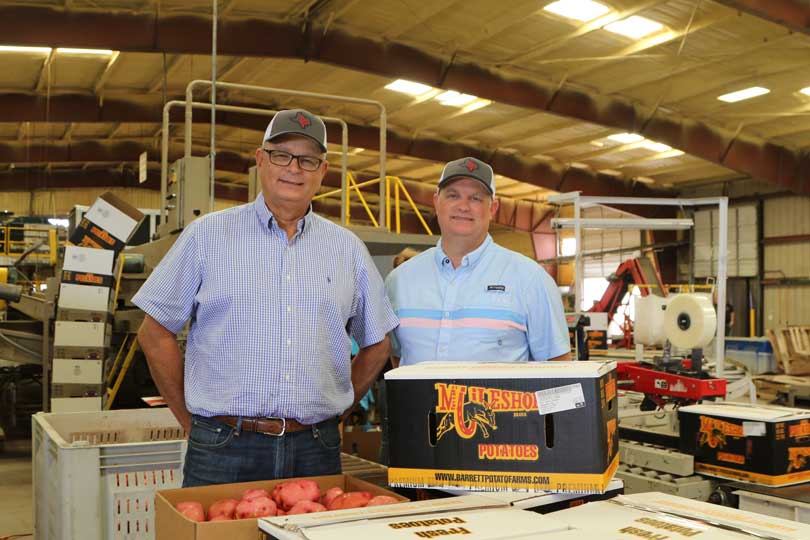By Jennifer Dorsett
Field Editor
The seemingly endless sky stretches in every direction over a vast field. The brownish-red earth appears bereft of vegetation, like nothing has grown there lately. But just underneath the surface, tasty treasure awaits.
Richard Barrett lifted something from the ground and gently brushed away the dirt.
“Now, that’s a nice one,” he said with a smile.
Barrett’s family has been growing potatoes for nearly 80 years, reaping buried treasure from the sandy soil of the Texas Panhandle.
In 1939, Fred Barrett, Richard’s grandfather, was a potato farmer in Idaho. He heard there was good land and water suitable for growing potatoes in Texas, so he moved his family to Hereford. Richard said his grandfather made the move to Texas because they were closer to a potato-hungry population who didn’t have easy access to the tubers at the time.
Fred’s four sons followed him into the potato business, opening packing sheds in Muleshoe, Seminole and Springlake. Today, Richard, along with his son, Keith, operates the Muleshoe packing shed started by his father.
“It makes you proud, because we work hard at what we do, and we’re feeding a lot of people,” Keith said.
They don’t do it without plenty of help, though. Tim Gonzalez, operations manager for the farm, grew up watching his own father work for Barrett Potato Farms. During school, Tim started working part-time on the farm in the summers and has been with the business for more than 30 years now.
Gonzalez oversees more than 1,200 acres of potatoes. He said cool nights paired with long, warm days make the Panhandle Plains the perfect place for growing potatoes. The loose, sandy soil is ideal for growing a nice, round potato and drains well when it rains.
Potatoes are planted around the first of March and take from 70 to 120 days to reach maturity. Seed potatoes are quartered and planted in the ground, and the resultant plants are irrigated with a watchful eye until harvest time. A desiccant is applied to the plants so they wither and die, allowing a machine to come through and easily separate the dead plant matter from the potatoes when they are dug up.
The Barretts have learned a few farming tricks over the years, and they even helped design a custom harvester a few years ago. After looking at the processing equipment at the potato shed, they realized some of those mechanisms could be incorporated into the harvesting equipment to keep the potatoes in as pristine condition as possible.
“You’re going to retail. It’s not a process potato,” Keith said. “It’s what they’re going to put out on the shelves in the grocery store, and you want it to look good. So we have to be really careful in how we handle them. The varieties of potatoes we’re dealing with are very thin-skinned, so we want to handle the potatoes very gently.”
That commitment to their product has kept the Barrett name synonymous with quality over the years.
“Quality is number one for us,” Gonzalez said. “Seeing a beautiful crop come out of our soil and being able to ship it everywhere in the United States—even on bad years, low-price years—we’re still going to be able to sell our crop. In high-price years, we’re definitely going to be in high demand.”
Millions of pounds of potatoes are grown and shipped by the Barretts every year. Richard said he remembers when potatoes had to be dug up in the fields and picked up by hand, requiring large crews and manual labor. Growing, sorting and shipping tons of the smaller-sized potatoes popular today would not have been feasible.
“In 1940, it was all done by hand,” Richard said. “But today, we are mechanized, and we try to do everything as automatically as we can. Consumer demand has changed, and so we’re doing different things with the potatoes to meet that demand.”
They have shifted production over the years from mainly Russet, the large white baking potatoes, to more yellow and red varieties, which are enjoying current popularity in the smaller “creamer” size.
The majority of Barrett potatoes grade at USDA number one, the best quality, and are sold for retail operations. Those that grade lower go to the food service industry and food banks, and those with any physical defects or bad spots are sold for cattle feed.
The packing sheds operate nearly non-stop fr


Hello my name is Francisco Medina I have a pallets business in Roswell New Mexico and in just looking for new costumers I want offer my service to you I sell 48×40 and other sizes pallets A grade and B grade here’s my number if you are interest give me a call thank you